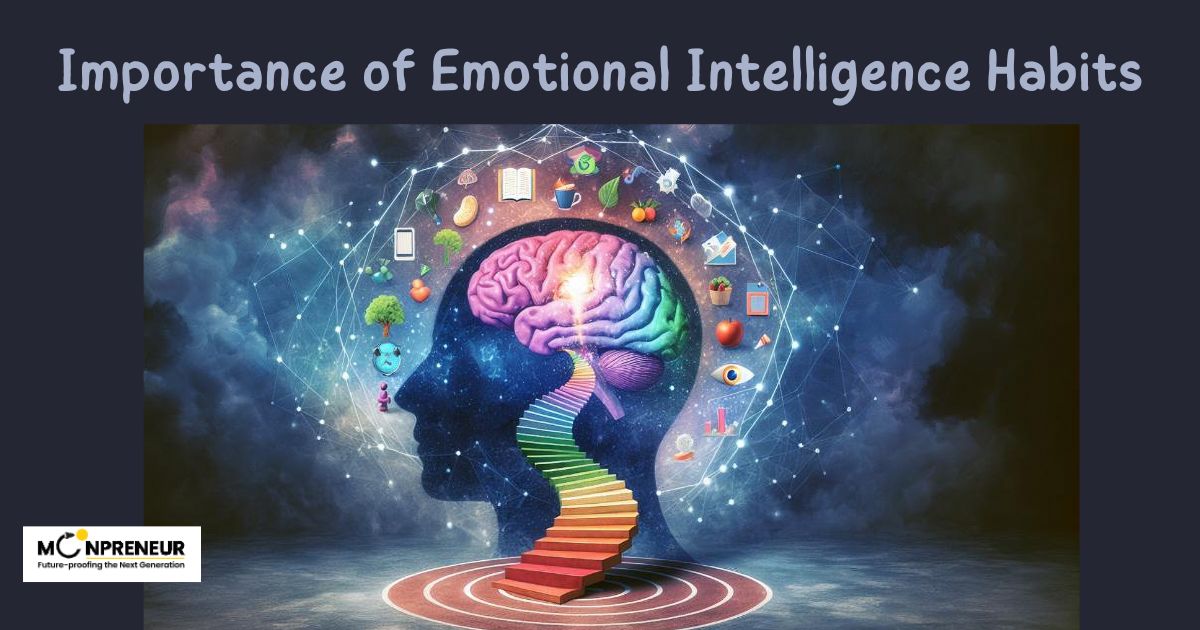
Habits of People with High Emotional Intelligence
Emotional intelligence (EQ) has emerged as a critical factor in achieving professional success, often surpassing the influence of IQ. Research shows that people with average IQs outperform those with the highest IQs 70% of the time, thanks to their high emotional intelligence. Understanding and cultivating EQ can help you navigate social complexities, manage behavior, and make better decisions, all of which contribute to greater success.
The Importance of Emotional Intelligence Habits

Emotional intelligence habits consist of 4 core skills divided into two primary competencies: personal competence and social competence. Personal competence focuses on self-awareness and self-management, while social competence encompasses social awareness and relationship management. Developing these competencies can greatly enhance your professional and personal life.
Emotional Intelligence Habits Book-
CHANGE YOUR HABITS, CHANGE YOUR LIFE.

With over 3 million emotional intelligence books sold, Dr. Travis Bradberry, co-author of the best-selling “Emotional Intelligence 2.0,” brings you his groundbreaking new book, “Emotional Intelligence Habits.” In this comprehensive guide, Dr. Bradberry, a leading expert on EQ, provides practical strategies to help you form beneficial habits, break detrimental ones, and master the micro-behaviors that will elevate your EQ. Included with the book is a passcode for the updated online edition of the world’s most popular EQ test, the Emotional Intelligence Appraisal®. This tool will assess your current EQ and identify which habits from the book will most effectively boost your emotional intelligence.
Place to buy this book: Amazon
Price on Amazon: $22
10 Key Habits of Emotionally Intelligent People

1. Practicing Positivity
Emotionally intelligence habits individuals maintain a positive outlook, regardless of external circumstances. They focus on what they can control— their effort and attention—rather than being overwhelmed by negative news or situations. This mindset not only boosts their mood but also enhances their performance at work.
2. Expanding Emotional Vocabulary
High-EQ individuals can accurately identify and articulate their emotions. Instead of saying they feel “bad,” they might specify feelings such as “irritable,” “frustrated,” or “anxious.” This precise understanding helps them manage their emotions more effectively and respond appropriately to various situations.
3. Being Assertive
Balancing empathy with assertiveness, emotionally intelligent people can handle conflicts without resorting to passive or aggressive behavior. They communicate their needs and boundaries clearly and respectfully, which helps them manage relationships and avoid unnecessary conflicts.
4. Cultivating Curiosity About Others
Empathy drives emotionally intelligence habits individuals to be genuinely interested in others. This curiosity helps them build strong connections and understand different perspectives, enhancing their social interactions and teamwork.
5. Forgiving Without Forgetting
Emotionally intelligent people let go of grudges to avoid the stress and health issues associated with holding onto negative emotions. They forgive others to move on but remain cautious to protect themselves from future harm, ensuring they do not fall into the same negative situations again.
6. Maintaining Self-Worth
These individuals derive their self-worth from within rather than comparing themselves to others. They acknowledge their achievements and do not let external opinions dictate their happiness. This self-assurance helps them stay focused on their goals and remain resilient in the face of criticism.
7. Injecting Fun Into Their Lives
Emotionally intelligent people find ways to make their tasks enjoyable. They integrate fun into their daily routines, whether by turning work into games or taking breaks to engage in activities they love. This approach helps them manage stress and maintain high levels of motivation and productivity.
8. Being Hard to Offend
With a strong sense of self, emotionally intelligent individuals are less likely to be offended by others’ comments or actions. Their confidence and open-mindedness allow them to take criticism constructively and avoid unnecessary conflicts.
9. Quashing Negative Self-Talk
Emotionally intelligent people recognize and stop negative self-talk. They challenge irrational thoughts and replace them with more realistic and positive ones. This habit helps them maintain a healthy mindset and make better decisions.
10. Building Emotional Intelligence
Unlike IQ, EQ can be developed and improved over time. By consistently practicing emotionally intelligent behaviors, you can create new neural pathways that make these habits more automatic. Over time, you will respond to challenges with greater emotional intelligence, enhancing your professional success and personal fulfillment.
Conclusion
Cultivating these emotional intelligence habits can lead to profound improvements in your personal and professional life. By enhancing your self-awareness, self-management, social awareness, and relationship management skills, you can navigate life’s challenges with greater ease and build stronger, more fulfilling relationships. Start integrating these habits into your daily routine and experience the transformative power of emotional intelligence.
Looking for a comprehensive parenting guide to ensure you are on the right track? Explore a wealth of parenting wisdom and educational insights in Moonpreneur’s blogs. Additionally, you can join our programs that nurture the next generation of innovators. Book a free trial now!

























